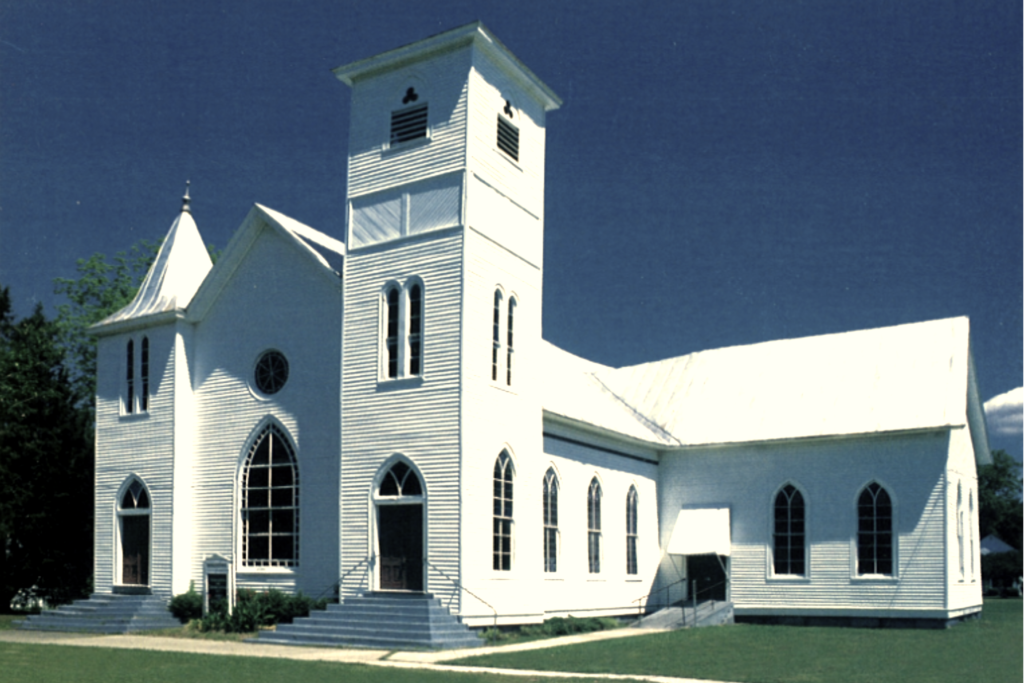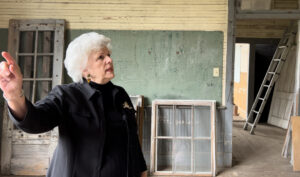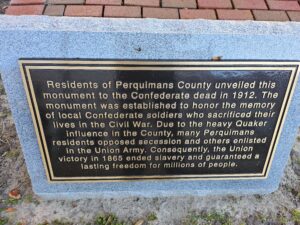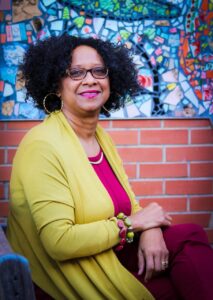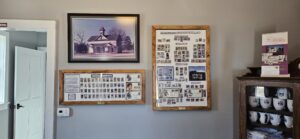By Amy Beth Wright
The Kadesh A.M.E. Zion Church, at the heart of the Edenton, North Carolina community since the turn of the century, has urgently needed restoration since September of 2003, when Hurricane Isabel battered eastern North Carolina. Hannibal Badham, Sr., a formerly enslaved carpenter, built the church in 1897, with Tiffany stained glass windows, an expansive sanctuary, and Gothic Revival elements. To initially generate funds for restoration, congregation members held raffles, yard sales, and dinners. In 2019, the Edenton Historical Commission partnered with the church, and a 2022 North Carolina state grant has pushed the project further along. The church has been nominated for the National Trust for Historic Preservation’s list of America’s 11 most endangered historic places.

Congregant Sadie Riddick grew up at Kadesh, and chairs the restoration project. Of the years since Hurricane Isabel, she says, “It hurt me to not see something being done.” Here, Ms. Riddick describes childhood memories of the church and visceral memories of growing up in segregated society. Now, she says, “I’ll just be glad when we get back into Kadesh. I often say that I pray that God will allow me to live long enough to see that happen. I want to be able to walk down that aisle and into that choir box and sing one more time. I believe that if I can do that, I’ll be happy, and if God wants to take me that day, I’ll be satisfied.”
Sadie RiddickWhat are some of your early memories of Kadesh?
We did not have air conditioning—they’d lift the windows. In the wintertime, we had three potbelly stoves, and it was warm in there. The church filled with about 300 people every Sunday morning. It was packed. Before Isabel, we still would have close to 150 people come to church. To hear the music from the organ and the choir and to see the people come in and worship—it was really, really amazing.
I went to Sunday school, and the 11 o’clock service. If we had a service between six and seven, I had to go, and I had to sit up front. I could not talk or nod my head back like I was asleep. I had to sit up straight. I sang in the junior choir from the time I was maybe 10 years old. I’m 72 years old now and I’m still singing in the choir. On Wednesday nights we had Bible study, and I looked forward to that. I’ve seen preachers come and go. I’ve seen members come and go, but we were always together as far as getting things done, and making sure that the church was taken care of.
The church is an architectural treasure. What was it like inside, then?
Looking up, it looks like the bottom of a boat. I often wondered as a little girl how I could see everything upfront. When everything was taken out, I could see it’s sloped, like a movie theater, so you can see everything no matter where you are sitting. It’s beautiful.
What is special about Kadesh, as a place to worship?
We don’t turn people away. No matter what color you are, what religion you are, or whatever the case might be. Our doors are always open, and they’ve always been like that. Even when segregation was going on, with all the hatred and everything, I cannot remember Kadesh ever turning anybody down that wanted to come and worship.
As you were growing up, what were race relations like in Edenton?
Ah, everything was separated. Blacks here, whites here, you know. We were not allowed in white churches, but deep down inside I believe that if someone white came to a black church, they would have been welcomed. The stores were different. I can remember as a little girl going into a drugstore to get my grandmother’s medicine. I was nine years old, in 1959, and they were picketing that Saturday. I sat at the counter to get a six-cent cup of ice cream, and the young lady would not serve me, because I was sitting at the counter. She went and got her boss, who told me that I couldn’t sit there. And I said, ‘Well, I just want some ice cream.’ And he said, ‘You can get the ice cream once you get up out of my chair.’ And so I got up. I walked out. I did not pay for the ice cream. He ran behind me to make me pay, but I refused. I got in my grandmother’s car, and I told her what had happened. She went back in and told him that she would no longer do business with him because of the way that he had treated me that day. And she didn’t. We went to another drug store, and we were treated differently.
What role did the church play during the Civil Rights movement?
A lot of conventions and rallies met at Kadesh. Reverend Abernathy came to our church for a big meeting after Martin Luther King came to Edenton. It was also a meeting place for the Masons, and big musical programs and annual conferences were held at Kadesh. When we had homecoming, busloads of people came from New York—family members that left would come back. For some reason, that’s not happening anymore.
Why is that?
I think the pandemic had a lot to do with it. I’ve had members of the white congregation talk to me about that too. It’s a big change. Kids are inside, in their rooms, doing their thing on their laptop, iPad, and telephone. Some bring their cell phones to church. My sister and I always talk about, when we die, what’s going to happen? How is church going to function once we’re gone?
What does the future look like then?
I’m praying that the future will be bright. And by bright I mean that somebody will want to come in, be a part of Kadesh, and keep it going. I’m praying for that. Hopefully that’ll come around with this generation.
What made you love being at Kadesh, as you were growing up?
Listening to the older people talk—I enjoyed being around older people. At age nine, I did errands for the older people, especially the little ladies in church, because my grandmother was one of these people that did everything for anybody, no matter what it was. And she always told me, ‘If I die, I need you to take care of the little old ladies in the church.’ And that’s exactly what I did. I was faithful. And I did it. Also, the people in the church took a great interest in the children. If it wasn’t for the older generation teaching my generation, we would not have a church. The funny thing is, I got tired of going to church when I was young, and I told my mom, ‘When I turn 18, I’m not going to church and I’m not sending anyone.’ That didn’t last long though, because I really, really enjoy going to church.


